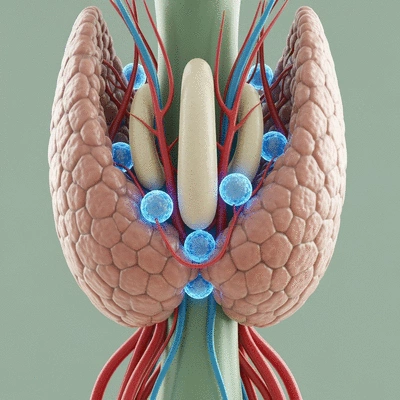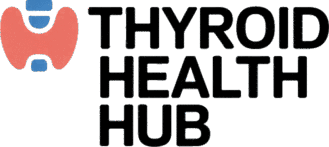Iodine's Impact on Thyroid Hormones

Did you know that just 150 micrograms of iodine a day can be crucial for your thyroid health? This trace element plays a significant role in hormone production, impacting everything from your metabolism to energy levels. Let’s explore the essential insights regarding iodine and its importance in maintaining a healthy thyroid.
What You Will Learn
- Iodine is essential for producing thyroid hormones, which regulate metabolism and energy levels.
- A deficiency in iodine can lead to severe health problems, including hypothyroidism and goiter.
- Both lack and excess of iodine can trigger autoimmune thyroid conditions, emphasizing the need for balance.
- Monitoring your iodine intake through dietary assessments and tests can help maintain optimal thyroid health.
Iodine's Vital Role in Thyroid Health
This visual outlines the crucial processes and components involved in thyroid hormone production, highlighting the indispensable role of iodine.
Iodine Intake & Absorption
The body cannot produce iodine; it must be absorbed through diet.
- RDA: 150 micrograms/day (adults)
- Sources: Seafood, dairy, iodized salt
Thyroid Gland Function
Butterfly-shaped gland in the neck, central to metabolism.
- Produces T3 (triiodothyronine)
- Produces T4 (thyroxine)
- Regulates energy utilization
Hormone Synthesis (T3 & T4)
Iodine is crucial for the synthesis of thyroid hormones.
- Without iodine, production falters
- Regulates metabolism & energy
- Impacts growth & development
Health Outcomes
Adequate iodine: smooth metabolism. Deficiency: health issues.
- Deficiency leads to hypothyroidism
- Symptoms: fatigue, weight gain, depression
- Goiter, developmental issues
The Essential Role of Iodine in Thyroid Hormone Production
Many people don't realize just how vital iodine is to our overall health, particularly when it comes to thyroid function. As a board-certified endocrinologist, I've seen firsthand how crucial this trace element is for producing hormones that regulate metabolism and energy levels. In this section, we'll explore what iodine is, why it matters, and how it directly influences your thyroid health.
Iodine is a naturally occurring element found in certain foods and is essential for producing thyroid hormones. Without adequate iodine, your thyroid cannot function properly, leading to various health issues. Have you ever considered how your diet might impact your thyroid? Let’s dive deeper into understanding iodine.
Understanding Iodine: What It Is and Why It Matters
Iodine is a mineral that the body needs but cannot produce on its own. It's primarily absorbed through our diet, making it essential to include iodine-rich foods in our daily meals. The recommended dietary allowance (RDA) for adults is around 150 micrograms per day. Without sufficient iodine, your thyroid may struggle to produce hormones effectively, leading to conditions such as hypothyroidism. Research published in Frontiers in Endocrinology further highlights the critical role of iodine in maintaining thyroid health.
- It's important for hormone production
- Supports metabolic processes
- Essential for fetal development during pregnancy
As your body’s energy regulator, the thyroid requires iodine to create hormones. Many people are unaware of how easy it is to become iodine deficient, especially if your diet lacks seafood, dairy, or iodized salt. Have you checked your iodine intake recently?
The Thyroid Gland: A Brief Overview of Its Functionality
The thyroid gland, shaped like a butterfly, is located at the base of your neck. This small but mighty gland plays a central role in maintaining your body's metabolism. It produces thyroid hormones—primarily T3 (triiodothyronine) and T4 (thyroxine)—that help control how your body utilizes energy.

When iodine levels are adequate, the thyroid can produce enough hormones to keep your metabolism running smoothly. However, when there’s a lack, it can lead to fatigue, weight gain, and even depression. Understanding how your thyroid functions can empower you in managing your health effectively. For more detailed information, delve into the mechanisms of thyroid hormone synthesis.
Did You Know?
According to the World Health Organization, approximately 2 billion people worldwide are estimated to be iodine deficient, which can lead to significant health issues, including impaired cognitive development in children. Ensuring adequate iodine intake is crucial for maintaining thyroid health and overall well-being.
Frequently Asked Questions About Iodine and Thyroid Health
Q1: Why is iodine essential for thyroid health?
Iodine is a crucial mineral that the body cannot produce on its own. It is essential for the thyroid gland to synthesize thyroid hormones (T3 and T4), which regulate metabolism, energy levels, and overall growth and development.
Q2: What happens if I don't get enough iodine?
An iodine deficiency can lead to hypothyroidism, a condition where the thyroid gland doesn't produce enough hormones. Symptoms include fatigue, weight gain, depression, and in severe cases, goiter (enlargement of the thyroid gland) and developmental issues, particularly in children.
Q3: Can too much iodine be harmful?
Yes, both a deficiency and an excess of iodine can negatively impact thyroid health. Too much iodine can also trigger or exacerbate autoimmune thyroid conditions. It's important to maintain a balanced intake.
Q4: How much iodine do adults need daily?
The recommended dietary allowance (RDA) for adults is approximately 150 micrograms per day. Pregnant and lactating individuals may require higher amounts.
Q5: How can I monitor my iodine levels?
Monitoring iodine levels can involve dietary assessments to check your intake of iodine-rich foods, and in some cases, a urine test can assess recent iodine intake. Regular thyroid function tests (TSH, T3, T4) are also crucial for evaluating overall thyroid health. Consulting with a healthcare provider is recommended for personalized guidance.
Summarizing the Importance of Iodine in Thyroid Health
As we’ve explored the essential role of iodine, it’s clear that this trace element is vital for maintaining optimal thyroid function. Understanding iodine’s integral role in hormone production can empower you to make informed decisions about your health. It's not just about the quantity of iodine in our diets; it’s also about its bioavailability and the overall balance within our body!

Iodine is crucial for the synthesis of thyroid hormones, which regulate metabolism, energy production, and growth. Without adequate iodine, our bodies may struggle to produce enough of these hormones, leading to various health issues, including hypothyroidism. Here are a few key takeaways on iodine’s importance:
- Iodine deficiency can lead to severe health problems, including goiter and developmental issues.
- Both excess and deficiency of iodine can trigger autoimmune thyroid conditions.
- Understanding your iodine needs is vital for maintaining thyroid health, especially during pregnancy and lactation.
Future Research Directions: What’s Next for Iodine Studies?
As an endocrinologist, I am always excited to witness the evolution of research surrounding iodine and thyroid health. Emerging studies are diving deeper into molecular mechanisms related to iodine intake and autoimmune thyroid diseases. This research, such as findings on the role of iodine in thyroid health and disease, may open up new avenues for prevention and treatment, allowing us to better understand the complex interplay between iodine and thyroid function.
We also anticipate further investigation into how cultural and geographic variations impact iodine status globally. These studies could help develop public health initiatives tailored to specific communities, ensuring everyone has access to adequate iodine levels. With ongoing research, we can look forward to discovering innovative therapies that enhance iodine’s role in metabolic syndromes.
Taking Action: Ensuring Adequate Iodine Intake
How to Monitor Your Iodine Levels Effectively
Monitoring your iodine levels is essential for maintaining thyroid health. You might wonder, “How do I know if I’m getting enough iodine?” One effective way is through dietary assessments combined with thyroid function tests. Regular check-ups with your healthcare provider can help you keep track of your iodine levels, especially if you have risk factors such as pregnancy or a history of thyroid issues.
Here are a few steps to help you monitor your iodine intake:
- Evaluate your diet for iodine-rich foods—are you consuming enough?
- Consider getting a urine test to assess recent iodine levels, as it reflects recent intake.
- Discuss your findings with your healthcare provider to determine if supplementation is necessary.
Resources for Further Reading and Support
At Thyroid Health Hub, we believe in the power of education to empower individuals like you on your health journey. Accessing reliable resources is crucial for understanding more about iodine and its impact on thyroid health. I encourage you to check out some valuable materials that can provide deeper insights and practical tips:
- The Importance of Iodine for Thyroid Health
- Dietary Recommendations for Thyroid Patients
- Understanding Thyroid Function Tests
Understanding Thyroid Function Tests and Serum Thyroglobulin
Thyroid function tests are critical for assessing how well your thyroid is working. These tests typically include measurements of Thyroid Stimulating Hormone (TSH), T3, and T4. Additionally, serum thyroglobulin can be a helpful marker, especially for those with a history of thyroid disease or cancer.
Monitoring these levels ensures that any changes in your iodine intake are reflected in your overall thyroid health. Regular testing can help catch any potential issues early, allowing for timely intervention and management. Remember, you have the power to take charge of your health, and understanding these tests is a significant step towards that goal!
Recap of Key Points
Here is a quick recap of the important points discussed in the article:
- Iodine is essential for the production of thyroid hormones, which regulate metabolism and energy levels.
- Both iodine deficiency and excess can lead to autoimmune thyroid conditions and severe health issues.
- Regular monitoring of iodine intake through dietary assessments and tests is vital for maintaining thyroid health.
- Pregnant individuals should pay special attention to their iodine levels to support fetal development.
- Accessing reliable resources can empower individuals to understand and manage their thyroid health effectively.








